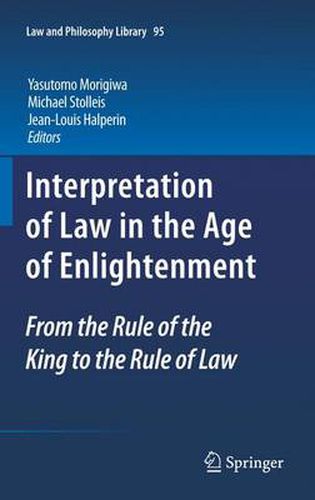Readings Newsletter
Become a Readings Member to make your shopping experience even easier.
Sign in or sign up for free!
You’re not far away from qualifying for FREE standard shipping within Australia
You’ve qualified for FREE standard shipping within Australia
The cart is loading…






This title is printed to order. This book may have been self-published. If so, we cannot guarantee the quality of the content. In the main most books will have gone through the editing process however some may not. We therefore suggest that you be aware of this before ordering this book. If in doubt check either the author or publisher’s details as we are unable to accept any returns unless they are faulty. Please contact us if you have any questions.
A collaboration of leading historians of European law and philosophers of law and politics identifying and explaining the practice of interpretation of law in the 18th century. The goal: establishing the actual practice in the Age of Enlightenment, and explaining why this was the case. The ideology of the Age was that law, i.e., the will of the sovereign, can be explicitly and appropriately stated, thus making interpretation redundant. However, the reality was that in the 18th century, there was no one leading source of national law that would be the object of interpretation. Instead, there was a plurality of sources of law: the Roman Law, local customary law, and the royal ordinance. However, in deciding a case in a court of law, the law must speak with one voice. Hence, interpretation to unify the norms was inevitable. What was the process? What role did justification in terms of reason, the hallmark of the Enlightenment, play? These are some of the questions addressed.
$9.00 standard shipping within Australia
FREE standard shipping within Australia for orders over $100.00
Express & International shipping calculated at checkout
This title is printed to order. This book may have been self-published. If so, we cannot guarantee the quality of the content. In the main most books will have gone through the editing process however some may not. We therefore suggest that you be aware of this before ordering this book. If in doubt check either the author or publisher’s details as we are unable to accept any returns unless they are faulty. Please contact us if you have any questions.
A collaboration of leading historians of European law and philosophers of law and politics identifying and explaining the practice of interpretation of law in the 18th century. The goal: establishing the actual practice in the Age of Enlightenment, and explaining why this was the case. The ideology of the Age was that law, i.e., the will of the sovereign, can be explicitly and appropriately stated, thus making interpretation redundant. However, the reality was that in the 18th century, there was no one leading source of national law that would be the object of interpretation. Instead, there was a plurality of sources of law: the Roman Law, local customary law, and the royal ordinance. However, in deciding a case in a court of law, the law must speak with one voice. Hence, interpretation to unify the norms was inevitable. What was the process? What role did justification in terms of reason, the hallmark of the Enlightenment, play? These are some of the questions addressed.